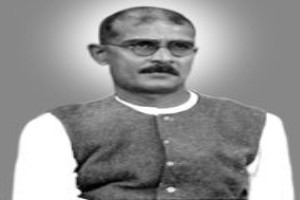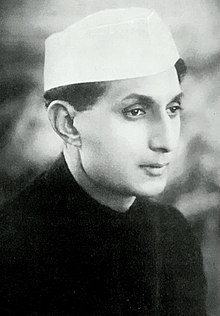
 By Mahadev Desai*
By Mahadev Desai*
(This article was published in Harijan on Saturday, May 16, 1936)
Rajatarangini – an epic poem of the 12th century by the great Kashmiri poet Kalhana – has been presented to the English reading public, with exhaustive and valuable annotations, appendices etc. by Shri Ranjit Pandit who has laid not only Sanskrit scholars but students of Indian history under a deep debt of gratitude. For the poem is a history too and though it is the story of kings and royal families and the nobility of Kashmir, it is, as Pandit Jawaharlal Nehru in his foreword says “a rich storehouse of information, political, social and to some extent, economic,” about a “country which delighted in insurrection.”

The interest of the readers of Harijan in this monumental work lies in the vivid picture it gives of the social conditions of the mediaeval times. The earlier translation by Sir Aurel Stein whose interest in the book was mainly archaeological and topographical omits certain passages which he held were unconnected with the narrative proper. Shri Ranjit Pandit has presented an unabridged translation and we thus get through it all the references in the poem to “untouchables” and the people’s attitude to them. There were no slaves in those days and no purdah, but the condition of the common people in Kashmir, says Shri Pandit in his introduction, “did not differ in essential respects from serfdom. Neither caste nor birth was, however, a bar to the holding of any civil or military posts, the Domb and the Brahman were alike soldiers”, “inter-caste marriages are mentioned,” and “even untouchability was no bar.”
The poet describes in the fifth canto the circumstances in which king Chakravarman (923-933 A.D.) married an untouchable Domb woman (the Dom of the present day), and made her “the premier queen who enjoyed the privilege among royal ladies of being fanned by the yak-tail.”
Also read: History Recalled: Tolstoy’s letter to a Hindu
“At this juncture a famous Domb vocalist named Ranga, a person from abroad, was granted an audience by the king. Followed by his own troupe decked in necklaces, wristlets, armlets, bracelets and other trinkets the Domb singer made his entry. Hamsi and Nagalata, his two daughters, with pellucid eyes made the assembly which was straining its neck in curiosity, appear as if delineated in a picture. Between the king and the two of them, whose hearts were drawn towards one another, through the exchange of glances comprehensible to themselves, a conversation was as it were established” (V. 354, 359, 360, 367).
A sycophant of the king fans his passion into flame by diverse arguments one of them being that “there should be no discrimination against women of the untouchables merely because of the unreasonable prejudice of those who followed the scripture (V 375). “The king’s love at sight waxed strong with constant audiences and in the absence of these two Shwapaka maidens the got no peace of mind any more. …By the king who was made blind with passion Hamsi was made the premier queen who enjoyed the privilege among the royal ladies of being fanned with the yak-tail. Those who had eaten of the leavings off her plate were councilors at the court of Chakravarman and of subsequent kings as well… Being blockheads some of the Shwapakas did not themselves act as councilors, but others who were worldly wise administered state affairs like ministers. … In this realm gods of dread supernatural power did not surely reside at that time, otherwise how could a Shwapaka woman have entered their temples! When she proceeded to visit Ranasvamin (temple) on the day of Tiladvadasi, only the proud Damaras did not follow in her train. An order issuing from the mouth of the Dombas who were proud of their status as members of the king’s family became like a royal command difficult to transgress and was not transgressed by any one.” (V 383, 387, 388, 390, 394, 395, 396). “Even worse sinners than the king (who had taken an untouchable woman to wife), were some Brahmans who accepted Agraharas even from him and fed at his residence.” (V. 403). Then comes Yasaskara, a later king, who associates with followers “who had partaken of the food remnants of the Dombas” and “uncleanness came over Yasaskara just as from the touch of a leper befalls the affliction of leprosy.” (VI. 84). In the same canto the king’s consort is described as running away with a Chandala night-watchman.
Chandalas as soldiers and adept archers are referred to at various places throughout the text. Shwapakas are posted on crests of hills for their sure archery (5. 218). Srideva, a village Chandala accompanies villagers to the battle and with unerring aim discharges a stone and kills Jajja instantaneously.
All these texts show that untouchables who are described as Dombas, Shwapakas and Chandalas had access even to the king’s apartments; that though public sentiment was against the marriage between a high caste Hindu and a Domba, it could not be very strong, for the King dared to defy it to the extent of making a Domba dancing girl his premier queen; that a Domba woman could visit a temple, and though the proud Damaras did not follows her, many did follow her. The king is referred to as a sinner for having taken an untouchable woman to wife, but certainly not for touching or introducing untouchable girls in his palace. That the Shwapakas and Chandalas were capable archers of sure aim and that they accompanied people to the battle also shows that thee was no untouchability in those days as we know it today. Kalhana, the poet, who was a Brahman looks down on these close associations with Dommbas and Shwapakas, but even he never seems to condemn touchability. In fact his own prejudice against association and social relations with “untouchables”, which would seem to be quite common two hundred years before him, was thus a later growth. The social relations, including marriage relations were there, and the poet expresses his own prejudice when in one place he says, “the king received condign punishment in the shape of defeat at the hands of untouchables for breach of morality.” But even in the 12th century the orthodox Brahman poet does not fight shy of untouchability as such, pollution by touch is nowhere mentioned, and he extols the virtues of Chandalas as warriors.
*Mahadev Desai was an eminent freedom fighter and Mahatma Gandhi’s personal secretary; article courtesy his grandson, Nachiketa Desai.





